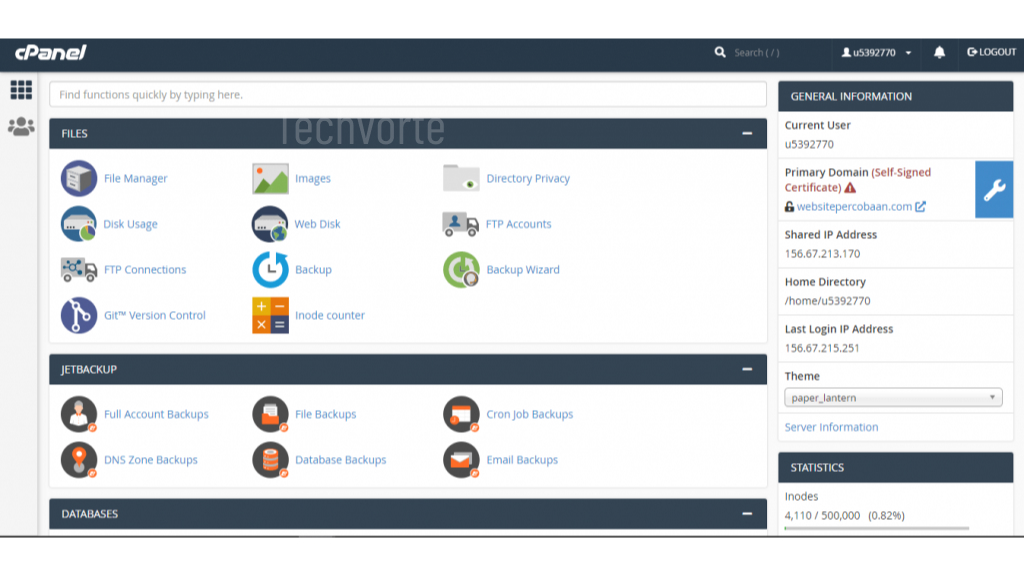Hi Tech Vorte readers! Plesk and cPanel are both web hosting control panels that offer a graphical interface and automation tools to simplify server and website management tasks.
While they share similar functionalities, they have differences in terms of features, user interface, and pricing.
Understanding Plesk and cPanel
In the world of web hosting, control panels play a vital role in managing web environments.
Plesk and cPanel are two of the most popular control panels used by website owners and hosting providers.
While both platforms serve the same purpose, they have significant differences in features and functionality.
When it comes to understanding the differences between Plesk and cPanel, one of the most notable differences is the user interface.
While cPanel has a more traditional and straightforward interface, Plesk has a more modern and intuitive interface with a sleek design.
| Features | Plesk | cPanel |
|---|---|---|
| Number of domains supported | Unlimited | Depends on the hosting plan |
| Supported operating systems | Windows, Linux, and MacOS | Only Linux |
| Database management | Support for MySQL, MS SQL, PostgreSQL, and more | Support for MySQL and PostgreSQL |
| Automatic updates | Yes | No |
| Security | Web Application Firewall (WAF), automatic backups, and SSL certificate management | SSL certificate management and protection against malware, spam, and phishing |
As shown in the table above, Plesk has a wider range of supported operating systems and databases, while cPanel has strict OS requirements.
Plesk also offers automatic updates, something that cPanel doesn’t provide, making it a more convenient option for many.
When it comes to security features, both platforms have similar options but different approaches.
While cPanel focuses on protecting against malware, spam and phishing, Plesk provides a full suite of features including WAF, automatic backups, and SSL certificate management.
Overall, it’s important to consider your hosting needs when choosing between Plesk and cPanel.
For those who prefer a simple and traditional interface, cPanel can be an ideal choice.
On the other hand, those looking for a modern-looking control panel with more flexible features may prefer Plesk.
Feature Comparison: Plesk vs cPanel

When it comes to hosting control panels, Plesk and cPanel are two of the most popular options available.
They both offer a range of features that allow website owners to manage their hosting environment with ease.
In this section, we will compare the key features of both Plesk and cPanel to help you decide which is the best fit for your web hosting needs.
File Management
| Feature | Plesk | cPanel |
|---|---|---|
| File Manager | Yes | Yes |
| FTP Access | Yes | Yes |
Domain Management
| Feature | Plesk | cPanel |
|---|---|---|
| Add/Remove Domains | Yes | Yes |
| Domain Aliases | Yes | Yes |
| Subdomains | Yes | Yes |
Email Management
| Feature | Plesk | cPanel |
|---|---|---|
| Email Accounts | Yes | Yes |
| Webmail | Yes | Yes |
| Email Forwarders | Yes | Yes |
Database Management
| Feature | Plesk | cPanel |
|---|---|---|
| MySQL Databases | Yes | Yes |
| phpMyAdmin | Yes | Yes |
| Remote MySQL | Yes | Yes |
Security Features
| Feature | Plesk | cPanel |
|---|---|---|
| SSL Certificates | Yes | Yes |
| Firewall | Yes | Yes |
| IP Ban | Yes | Yes |
As you can see, both Plesk and cPanel offer similar features when it comes to managing your hosting environment.
However, there are some differences that may make one option better suited to your needs than the other.
In the next section, we will discuss the advantages and benefits of each control panel to help you make an informed decision.
Advantages and Benefits
When it comes to web hosting, choosing the right control panel could make all the difference.
Let’s take a closer look at the advantages and benefits of using Plesk or cPanel for your hosting needs:
Advantages of Plesk over cPanel
- Support for Windows: Plesk is the preferred option for Windows hosting, whereas cPanel offers limited compatibility.
- User-Friendly Interface: The Plesk interface is modern, intuitive, and beginner-friendly.
- Scalability: Plesk has excellent scalability features, allowing you to manage multiple servers with ease.
- WordPress Management: Plesk includes WordPress Toolkit, making it easy to deploy, manage, and secure multiple WordPress sites.
Benefits of using cPanel over Plesk
- Extensive Documentation: cPanel documentation is extensive, providing plenty of resources for beginners and advanced users alike.
- Third-Party App Support: cPanel offers support for a wider range of third-party applications, including Softaculous and Fantastico.
- Price: cPanel pricing is generally more affordable than Plesk.
- C-Panel University: cPanel offers its users access to C-Panel University, an informative resource platform to learn more about the control panel and how to get the most out of it.
Plesk or cPanel for Web Hosting?
Ultimately, the choice between Plesk or cPanel for web hosting depends on your specific needs and preferences.
If you’re running a Windows-based server or require a user-friendly interface, Plesk might be the way to go.
However, if you value extensive documentation, affordable pricing or third-party app support, cPanel could be a better option.
Consider your unique requirements and how each control panel aligns with them.
A managed hosting provider like Rackspace can help you make a decision by taking care of the whole control panel issue so you can focus on your business.
Ultimately, whichever one you choose, both Plesk and cPanel are excellent options that can help you manage your web hosting environment with ease.
Conclusion
In conclusion, when considering Plesk vs cPanel, it’s important to understand the key differences between these two powerful hosting control panels.
Plesk is known for its ease of use and scalability, making it a great choice for small to medium-sized businesses.
On the other hand, cPanel offers a robust set of features and support for diverse operating systems, which makes it an excellent choice for larger enterprises.
Overall, both Plesk and cPanel have their unique selling points and offer exceptional functionality for managing website hosting environments.
Ultimately, the decision on which platform to choose will depend on individual requirements and preferences.
If you are looking for alternatives to Plesk and cPanel, some other hosting control panels worth considering include DirectAdmin, ISPconfig and Virtualmin.
Each of these platforms offers different features and benefits that may be more suitable for your needs.
We hope this Plesk vs cPanel review has provided you with valuable insights into these two industry-leading hosting control panels.
If you have any questions or comments, feel free to reach out to us.
FAQ
What is the difference between Plesk and cPanel?
Plesk and cPanel are both popular web hosting control panels, but they have some key differences. Plesk is known for its user-friendly interface and support for a wide range of operating systems, including Windows and Linux. On the other hand, cPanel is Linux-based and offers a more traditional, feature-rich control panel experience.
What features do Plesk and cPanel offer?
Both Plesk and cPanel provide essential features for managing web hosting environments. These include file management, domain management, email management, database management, and security features. However, the specific functionalities and interfaces may differ slightly between the two control panels.
Which hosting control panel is better, Plesk or cPanel?
The choice between Plesk and cPanel ultimately depends on your specific hosting needs and preferences. Plesk is often favored for its ease of use and support for multiple operating systems. In contrast, cPanel is a popular choice for Linux-based hosting environments and offers a more comprehensive set of features. It’s important to evaluate your requirements and consider factors such as scalability, integration with web applications, and support when making a decision.
What are the advantages of using Plesk over cPanel?
Some advantages of using Plesk over cPanel include its support for both Windows and Linux environments, user-friendly interface, and integration with popular web applications like WordPress. Plesk also offers a wider range of extensions and tools for managing and securing your hosting environment.
What are the benefits of using cPanel over Plesk?
cPanel offers a more traditional and feature-rich experience for managing Linux-based hosting environments. It provides a comprehensive set of tools for managing files, domains, databases, emails, and security. cPanel also has a vast community of users and developers, which means more available resources and support.
Are there alternative control panels to Plesk and cPanel?
Yes, there are alternative control panels available in the market. Some popular alternatives to Plesk and cPanel include DirectAdmin, ISPConfig, and InterWorx. These control panels offer similar features and functionalities, so it’s worth exploring them to find the one that best suits your hosting needs.





